JUST ABOUT DUNN
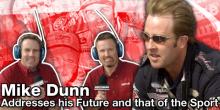 Mike Dunn's NHRA driving career has reached the point of no return.
Mike Dunn's NHRA driving career has reached the point of no return.
The
Southern California native, who recently signed a five-year contract
with ESPN that will keep him as a television analyst for the POWER Drag
Racing Series through the 2011 season, hasn't ruled out a return to the
23-race circuit, but for all intents and purposes, he believes he's
made his final competitive pass down a quarter-mile drag strip at a
NHRA national event.
"I haven't officially announced my retirement, but at least for five
more years I'll be doing TV," said Dunn, who name is often the first to
be mentioned when there is news about an open Top Fuel ride on the
POWERade Series tour. "I'm not going to retire, yet. I'll wait to see
how (Kenny) Bernstein (who recently announced his return to Funny Car
at the tender age of 62) does. I'll only be 55 then, so if he can do it
at (62), who knows?"
Veteran driver discusses his career, NHRA's future
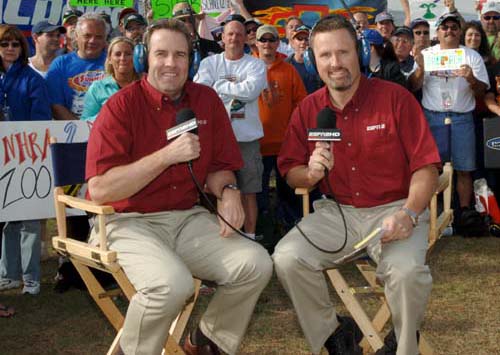
Mike Dunn's NHRA driving career has reached the point of no return.
The Southern California native, who recently signed a five-year contract with ESPN that will keep him as a television analyst for the POWER Drag Racing Series through the 2011 season, hasn't ruled out a return to the 23-race circuit, but for all intents and purposes, he believes he's made his final competitive pass down a quarter-mile drag strip at a NHRA national event.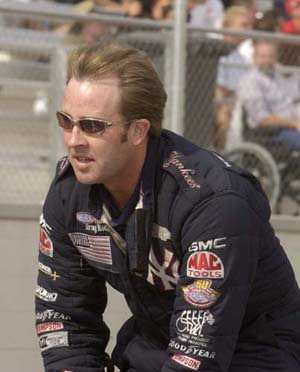 "I haven't officially announced my retirement, but at least for five
more years I'll be doing TV," said Dunn, who name is often the first to
be mentioned when there is news about an open Top Fuel ride on the
POWERade Series tour. "I'm not going to retire, yet. I'll wait to see
how (Kenny) Bernstein (who recently announced his return to Funny Car
at the tender age of 62) does. I'll only be 55 then, so if he can do it
at (62), who knows?"
"I haven't officially announced my retirement, but at least for five
more years I'll be doing TV," said Dunn, who name is often the first to
be mentioned when there is news about an open Top Fuel ride on the
POWERade Series tour. "I'm not going to retire, yet. I'll wait to see
how (Kenny) Bernstein (who recently announced his return to Funny Car
at the tender age of 62) does. I'll only be 55 then, so if he can do it
at (62), who knows?"What Dunn does know, though, is that he no longer wants to chase the dream of competing fulltime as a driver. Would he listen or entertain offers? Certainly. But for him, making test runs, like he did for Don Schumacher Racing and Doug Herbert the last two years, is good enough for now to fill his need for speed.
"The fire is gone as far as having to deal with car owners to go out and drive a race car," Dunn said. "When I get in car and drive from time to time, I still want to go out there and do well and win, like when I've tested...It's still there when I get in (a) car. But I have no desire to drive a 10th-place car and bust my ass to finish fifth in the points. I have no desire to do it to just win a race or two. I do have a desire to get with a team that has a legitimate chance to win a championship. But those rides are very hard to find."
So for now, informing TV viewers of what goes on during a quarter-mile run will suffice.
"I just made a decision that I wasn't going to take a cut in pay to drive a race car, anymore. I've done that," Dunn said. "I have nothing against that if you're 20 or 30-years-old. But when you're 50-years-old, I shouldn't have to do that at this point in my career.
a d v e r t i s e m e n t
Click to visit our sponsor's website
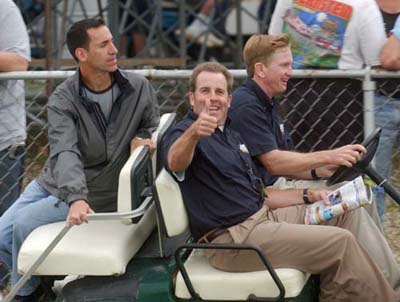 "If I can't get the kind of ride I want, I might as well continue to do
TV. It's a good gig. They treat me good, and the fans seem to like me
being there, which is always a good motivator. I'm at the point, where
I want to make a decent living, and I'm still involved in the sport I
love, so it's not all bad."
"If I can't get the kind of ride I want, I might as well continue to do
TV. It's a good gig. They treat me good, and the fans seem to like me
being there, which is always a good motivator. I'm at the point, where
I want to make a decent living, and I'm still involved in the sport I
love, so it's not all bad."
He's also proven to quite good at it.
Dunn, with 22 national event wins and a perennial top-10 finisher, is
able to provide his wrath of experience as a driver and mechanic to the
television viewers and relate to his audience with a non-gearhead
presentation that even the novice fan can understand.
"It's like my producer is always telling me,'Don't get too
technical,''' Dunn said. "There's a decent portion of our audience that
understands drag racing, but the majority don't. So we have to talk to
the (viewers) who don't understand it, basically. That's the audience
we are trying to get. That is what's going to bring in the new (fans).
If we do a show that all the drag-racing enthuisasts love, well, the
average guy is not going to like it, because he's not going to
understand it."
But it's not always easy. In fact, Dunn would say that in some aspects,
working a national event as a TV reporter, is a bit more challenging
than when he was competing against the likes of Don "The Snake"
Prudhomme, Kenny Bernstein, Gary Scelzi and Tony Schumacher.
"In some ways, it's more challenging," Dunn said. "In a nutshell, the
weekends we are doing the show, it's pretty intense, and it's for a
long period of time. From our production meeting on Friday, which is
about two hours before the first pro qualifying session, to when we
wrap up on Sunday, which is about two hours after the finals, it's
pretty non-stop. It's more non-stop than the driving thing was.
a d v e r t i s e m e n t
Click to visit our sponsor's website
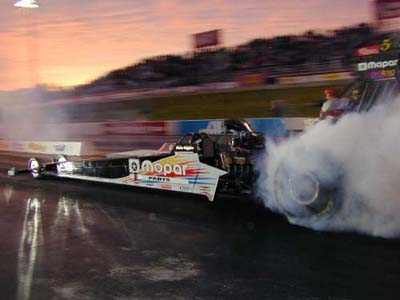 "But, once (a race is over), there's nothing to do until the next race.
But when you're a driver, you could be testing, or doing some
sponsor-related stuff and press tours. It was non-stop (during the
season). So in that respect, TV is easier. But on race weekend, it's
pretty intense to put on one of those shows."
"But, once (a race is over), there's nothing to do until the next race.
But when you're a driver, you could be testing, or doing some
sponsor-related stuff and press tours. It was non-stop (during the
season). So in that respect, TV is easier. But on race weekend, it's
pretty intense to put on one of those shows."And just like a race team, chemistry is key. And Dunn has been fortunate to basically work with the same group during his five years as a TV analyst. He's worked roughly with about four producers, but the inner-circle of the ESPN crew has basically been the same.
"You're only as good as the people around you," Dunn said. "We have a good core group. And one of the things I like about our show is that a lot of the people I work with, not just the (on-air talent), but from the people working in the production trailer to all the utility people working in the field, they are all drag race fans. They all love the sport.
"The production part of our show, from what they tell me because I've never done anything else, is one of the hardest shows to produce because it's all live-to-tape, and the days are long. But they do it, because they love it."
This past season offered a new challenge. Marty Reid, Dunn's partner the first four seasons, was signed to do cover the Indy Racing League, and was replaced in the NHRA booth for most of the 23 races by veteran motorsports broadcaster Paul Page, whose earned a first-rate reputation in IndyCar racing. And just as there would be a transition when a race team gets a new crew chief or driver, so to was with Page in the equation.
"There's no question we struggled big time in the beginning," Dunn said. "Part of the problem is that we were going back and fourth (between Reid and Page). It wasn't Paul's fault. It wasn't NHRA's fault, it was something the network decided to do.
"That didn't help out Paul, because he couldn't get in a rhythm. Once we got into the back-to-back shows in May, he started getting into a rhythm, and the last couple of shows were pretty good. We started to click much better. Obviously Marty and I had good chemistry, but we had been together for five years.
a d v e r t i s e m e n t
Click to visit our sponsor's website
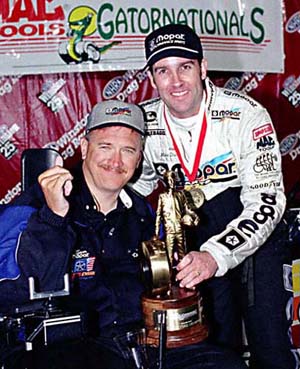 "Paul knows he has to get better, and he wants to get better. Our show
is produced differently than anything he's ever done. He always done
live shows, or taped shows he's voiced over live. So it's a lot
different. But if he can come out the way he left off (in August), I
think we'll be OK and he'll bring something to the show."
"Paul knows he has to get better, and he wants to get better. Our show
is produced differently than anything he's ever done. He always done
live shows, or taped shows he's voiced over live. So it's a lot
different. But if he can come out the way he left off (in August), I
think we'll be OK and he'll bring something to the show."Dunn also has a unique perspective of NHRA drag racing, having been a competitor and now a TV journalist. He believes the next season could be important in trailblazing a path for the sport's upcoming seasons.
"(NHRA has) Dan Olson (as director of Top Fuel and Funny Car Racing) replacing Ray Alley. I think that's a key on the competition side on what's going to happen," Dunn said. "I think some of the rule changes they've come up with have been terrible."
Dunn's main gripe is with the rule change that lowered the nitromethane percentage in Top Fuel and Funny Car engines from 90 to 85 percent. The rule was implemented to in effort to slow down the cars in the nitro classes. But, according to Dunn, the result was that it also made the engines more volatile, which has driven operating costs up.
"The 90-percent (nitromethane rule) was a great rule," Dunn said. "NHRA got a lot of complaints about it, initially. But none of them turned out to be true and it accomplished exactly what they wanted it to do. But going to 85 percent, that was a knee-jerk reaction to Darrell Russell losing his life (in 2004). It never should have happened, and the result is the costs have increased substantially to run under 85 percent."
According to Dunn, in this instance, less is not a good thing.
"You have run a 'X' amount of nitromethane to run a certain elapsed time and speed, period," he said. "So in a nutshell, instead of running it at 97-percent nitromethane with 3-percent alcohol, they are putting the same amount of volume that they were with 97 percent, but you also have that much more alcohol in the combustion chamber, which increases your cylinder pressure. To do that, they have to raise the compression, spin the blower harder and that's harder on the rods and crank shafts and you see a lot more engine damage.
a d v e r t i s e m e n t
Click to visit our sponsor's website
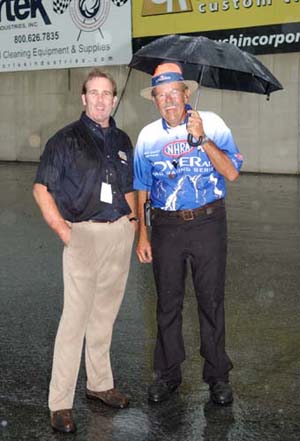 "The oil-down situation hasn't changed much because they have better
containment systems. But the cost to the racer has increased, and I
think it's needless."
"The oil-down situation hasn't changed much because they have better
containment systems. But the cost to the racer has increased, and I
think it's needless."Dunn's also not a big fan of the Rev-limiter, which in essence caps the amount of RPMs a engine can make during a particular run. Dunn tabbed it the "Alan-Johnson Rule' -- the U.S. Army dragster's crew chief, who has tuned most of the top performances in NHRA history.
"I hate that rev-limiter," Dunn said. "I just don't think it's a very good rule. Not because some crew chiefs have said that it hurts parts, that's not my main issue. I just hate the fact that you are penalizing one guy over another guy. If a guy hits the rev-limiter early because he's figured it out to run it harder and faster...It's the Alan-Johnson Rule, basically. He's figured it out how to run 5-to-7 mph faster than everybody else, and he's done it within the rules, so more power to him.
"Why do they have to say, 'Well, he's running too fast. We don't want the guys to run over 330.' Well, if he comes up against a guy who can run just 328 mph on his best day, well, why are you slowing Alan Johnson down, and not the other guy?. He gets (to basically) run without this rev-limiter. That's un-American. You don't penalize the guy who's figured out how to do it better and bring it down to the guys who aren't smart enough to figure it out."
But competitive regulation is no stranger in the sports. Leagues and organizations have done it almost from the beginning. One of the most notable instances was during the 1920s in college football when a rules committee outlawed the use of multiple players in motion. The rule was changed because competitors were unable to stop Notre Dame's shift offense, which included all four running backs moving at the snap of the ball.
NHRA, in its instance, argues that the use of a rev-limiter was not to provide competitive balance, but a way to cap the ever-increasing speeds in the sport. Dunn understands that, but he thinks the rev-limiter is the wrong approach.
"I have no problem if you say 330 mph, or whatever the number is, is as fast as we can run because that's as much as the tire will allow," he said. "You have to do that. Goodyear says you can't run over 340 mph, and yeah, you need to make the speed limit 330, 335 mph, whatever it is because safety is you're first concern. But then again, why not change the rule so the fastest guy can't run over that.
a d v e r t i s e m e n t
Click to visit our sponsor's website
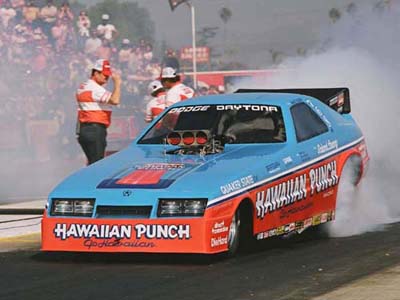 "I don't care if the other guys can't run faster than 320 mph. That's
their problem. It's not the sanctioning body's problem. I think what
ever rule you make, it should be what it is when the cars leave the
starting line. It should be the same for everybody. If one guy can
figure to run 5-7 mph faster under the rules...that's the way it should
be."
"I don't care if the other guys can't run faster than 320 mph. That's
their problem. It's not the sanctioning body's problem. I think what
ever rule you make, it should be what it is when the cars leave the
starting line. It should be the same for everybody. If one guy can
figure to run 5-7 mph faster under the rules...that's the way it should
be."Dunn is luke-warm on the new point system, which will create a two-tier playoff of sorts for the top eight cars in each category over the final six races. That field of eight will then be trimmed to four, who will then compete for the title at the final two events.
NHRA adopted the new format so the points championships in each pro class will be decided at the season finale. Dunn understands that, but he also can see why some are against the change.
"From a TV guy, I understand why (NHRA) did it," Dunn said. "I think it will do what they are trying to get it to do. But from the racers side of it, I'm still a traditionalist, and want the guy who ran the best all year long to be the champion. I don't like the idea where you can make one mistake and you can lose the championship.
"I hear the argument that every sport has a playoff system, and that as long as you make the playoffs and get hot, you can win the championship. That's partly true. But in football or baseball, they have four quarters or nine innings, and if they mess up in the first inning or the first quarter, they still have the whole game to come back.
"In drag racing, if you mess up (in the first round at either of the final two races), you don't get another chance. If you have a blower drive break, like what happened to Robert Hight (at Las Vegas in October), you're done. And it happens all the time with these teams. If you're in the hunt for the championship, and it happens in the first round at either of the final two races, you're done. You're not going to win the championship. I don't like that. But I understand why they are doing it. And yes, it will bring some excitement. But we haven't needed it the past two years."
Dunn, though is intrigued by how it will all play out over the course of the season as team's prep for the championship push.
"It's going to be interesting to see how the strategies and the scenarios play out," he said. "It's going to change it. How? Where just going to have to wait and see."
And Dunn and crew will describe it all on TV.
| {loadposition feedback} |







